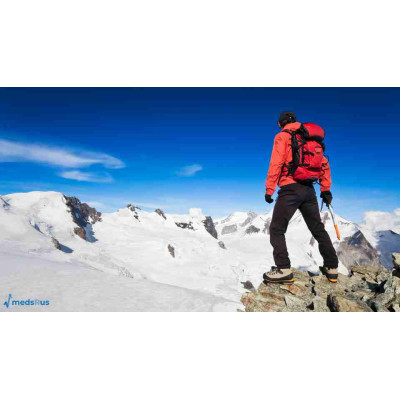
High-altitude adventures can come with a set of challenges, one of the most significant being altitude sickness. As your trusted pharmacists at MedsRUs Online Pharmacy, we're here to provide a comprehensive guide on understanding, preventing, and managing altitude sickness.
Understanding Altitude Sickness: The Basics
What is Altitude Sickness?
Altitude sickness, also known as acute mountain sickness (AMS), is a condition that occurs when you ascend to high altitudes too quickly, and your body struggles to adapt to the lower oxygen levels. There are three primary types:
- Acute Mountain Sickness (AMS): The most common form, presenting symptoms like headache, nausea, dizziness, and fatigue.
- High-Altitude Cerebral Edema (HACE): A severe and potentially life-threatening condition characterised by confusion, difficulty walking, and other neurological symptoms.
- High-Altitude Pulmonary Edema (HAPE): Another severe form, marked by shortness of breath, chest tightness, and a persistent cough.
Causes of Altitude Sickness
Why Does Altitude Affect Us?
At higher altitudes, the air pressure decreases, resulting in lower oxygen levels. To compensate, your body undergoes several physiological changes:
- Increased breathing rate to intake more oxygen.
- Enhanced heart rate to circulate oxygen more efficiently.
- Altered blood chemistry to improve oxygen delivery to tissues.
Recognising the Symptoms of Altitude Sickness
Early Signs and Severe Symptoms
Altitude sickness can vary from mild to severe:
- Mild AMS: Symptoms include headache, nausea, dizziness, fatigue, and sleep disturbances.
- Severe AMS, HACE, and HAPE: Look out for confusion, difficulty walking, shortness of breath, chest tightness, and a persistent cough, which require immediate medical attention.
Risk Factors for Altitude Sickness
Who is Most at Risk?
Several factors can increase your susceptibility to altitude sickness:
- Rapid Ascent: Climbing too quickly without proper acclimatisation.
- Physical Exertion: Overexerting yourself before your body has adapted.
- Previous History: If you've experienced altitude sickness before, you may be more prone.
- Age and Fitness Level: Interestingly, age and fitness level do not significantly impact risk, but certain medical conditions might.
Prevention Strategies for Altitude Sickness
How to Prepare and Acclimate
Preventing altitude sickness involves careful planning and preparation:
- Gradual Ascent: Ascend slowly, giving your body time to acclimate. Include acclimatisation days in your itinerary.
- Hydration and Nutrition: Drink plenty of water, eat balanced meals, and avoid alcohol and sedatives which can exacerbate symptoms.
- Altitude Sickness Medication: Consider using altitude sickness medication, which can be an effective preventive measure.
Coping with Altitude Sickness: What to Do if You Get Sick
Immediate Actions and Treatment Options
If you experience symptoms of altitude sickness:
- Descend: The most effective treatment is to descend to a lower altitude.
- Rest: Allow your body to recover by resting and avoiding physical exertion.
- Medical Help: Seek professional medical help if symptoms persist or worsen.
- Treatments: Oxygen therapy and portable hyperbaric chambers can be lifesaving in severe cases.
Altitude Sickness Myths and Facts
Debunking Common Misconceptions
There are many myths surrounding altitude sickness:
- Myth: Only unfit people get altitude sickness. Fact: Altitude sickness can affect anyone, regardless of fitness level.
- Myth: Drinking alcohol helps acclimatise. Fact: Alcohol can actually worsen symptoms.
Altitude Sickness in Different Regions
High-Altitude Destinations and Their Challenges
Each high-altitude destination presents unique challenges:
- Himalayas: Rapid elevation gains and extreme weather conditions.
- Andes: High starting elevations and varied terrain.
- Rockies: Less extreme but still requires careful acclimatisation.
- Kilimanjaro: Quick ascent profiles increase risk, making acclimatisation crucial.
Preparing for High-Altitude Treks: A Practical Guide
Gear, Training, and Planning
Preparation is key for a successful high-altitude trek:
- Physical Training: Build endurance and strength through a tailored fitness regimen.
- Gear Selection: Invest in high-quality, lightweight gear designed for high-altitude conditions.
- Itinerary Planning: Plan for gradual ascents and include rest days for acclimatisation.
- Altitude Sickness Medication: Ensure you have access to altitude sickness medication to help prevent and manage symptoms.
At MedsRUs Online Pharmacy, we are committed to helping you stay safe and healthy during your high-altitude adventures. Our range of altitude sickness tablets can make a significant difference in your experience, allowing you to enjoy the journey without worrying about the dangers of altitude sickness. Order your medication online today.
Order Altitude Sickness Medication
This blog was written on behalf of Medsrus by Pharmacy Mentor.


